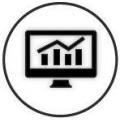This workshop will cover how to determine the geographic coordinates for address data. This is useful for creating maps, linking to other geospatial data, or finding distances between points. We will use two open source geocoders: Photon and The Data Science Toolkit. Participants will learn how to make API calls, how to parse the data, and how to map the results.
Sign up for our weekly newsletter!
This is an archive of our past training offerings. We are looking to include workshops on topics not yet covered here. Is there something not currently on the list? Send us a proposal.
This four part, interactive workshop series is your complete introduction to the capabilities of the Python language. By the end of the series, you will be able to apply your knowledge of basic principles of programming and data manipulation to collect data, process unstructured data, analyze tabular data, and automate the entire process.
This workshop will introduce geocoding - the process of determining the geographic location of a place name, zipcode or address. The first part of this workshop will be an introduction to the process of geocoding and strategies for achieving good results.
Join the Qualitative Methods Group (QMG) for a conversation with advanced graduate student Summer Starling about visually presenting qualitative data.
The R for Data Science workshop series is a four part course, designed to take novices in the R language for statistical computing and produce programmers who are competent in finding, displaying, analyzing, and publishing data in R.
Day 3 (analyzing data)
** CANCELLED *** ** CANCELLED *** To be Rescheduled ***
Citation management software can help organize research results and make writing papers easier by quickly creating properly formatted bibliographies and footnotes.
This four part, interactive workshop series is your complete introduction to the capabilities of the Python language. By the end of the series, you will be able to apply your knowledge of basic principles of programming and data manipulation to collect data, process unstructured data, analyze tabular data, and automate the entire process.
Coding is done, now what? You’ve finished coding your qualitative data and now it’s time to start the “analysis” process. Where do you start? Through this interactive workshop session, qualitative researchers will learn several approaches to transition from coding to analysis. Researchers in all phases of the qualitative research process are welcome to attend.
This workshop will introduce students to the SAS system. Participants will gain an understanding of the SAS environment as well as the functionality it provides, which includes data management and analysis. Students will learn the basics of the SAS programming language through examples, loading data sets and using built-in procedures.
The R for Data Science workshop series is a four part course, designed to take novices in the R language for statistical computing and produce programmers who are competent in finding, displaying, analyzing, and publishing data in R.
Day 2 (clean and tidy data)
This is the third workshop in a 3-part Stata series offered at the D-Lab that includes: 1) Intro to Stata, 2) Data Analysis in Stata and 3) Stata Programming.
This four part, interactive workshop series is your complete introduction to the capabilities of the Python language. By the end of the series, you will be able to apply your knowledge of basic principles of programming and data manipulation to collect data, process unstructured data, analyze tabular data, and automate the entire process.
This workshop covers how to organize and analyze qualitative data in Atlas.TI. Both researchers new to qualitative methods and experienced qualitative researchers are encouraged to attend.
This workshop will provide an introduction to digital geographic data - or geospatial data - and prepare you to work with these data in any software tool, whether it is desktop GIS like ArcGIS or QGIS or a programming language like R or Python.
New brown bag series, "How We Did It", a bi-weekly, hour-long presentation on specific topics from quantitative data cleaning to best practices for entering the field for participant observation.
Citation management software can help organize research results and make writing papers easier by quickly creating properly formatted bibliographies and footnotes.
The R for Data Science workshop series is a four part course, designed to take novices in the R language for statistical computing and produce programmers who are competent in finding, displaying, analyzing, and publishing data in R.
Day 1 (basics of R)
This workshop provides a discussion of federal regulations overseeing human subjects research, levels of review and application submission guidance.
Participants in this workshop will learn about some of the issues surrounding the collection of health statistics, and will also learn about authoritative sources of health statistics and data. We will look at tools that let you create custom tables of vital statistics (birth, death, etc.), disease statistics, health behavior statistics, and more.






